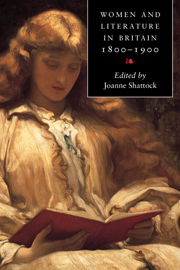Book contents
- Frontmatter
- Contents
- List of contributors
- Acknowledgments
- Chronology
- Introduction
- 1 The construction of the woman writer
- 2 Remaking the canon
- 3 Women and the consumption of print
- 4 Women writing woman: nineteenth-century representations of gender and sexuality
- 5 Feminism, journalism and public debate
- 6 Women's writing and the domestic sphere
- 7 Women, fiction and the marketplace
- 8 Women poets and the challenge of genre
- 9 Women and the theatre
- 10 Women writers and self-writing
- 11 The professionalization of women's writing: extending the canon
- 12 Women writers and religion
- 13 Women writing for children
- Guide to further reading
- Index
11 - The professionalization of women's writing: extending the canon
Published online by Cambridge University Press: 03 October 2009
- Frontmatter
- Contents
- List of contributors
- Acknowledgments
- Chronology
- Introduction
- 1 The construction of the woman writer
- 2 Remaking the canon
- 3 Women and the consumption of print
- 4 Women writing woman: nineteenth-century representations of gender and sexuality
- 5 Feminism, journalism and public debate
- 6 Women's writing and the domestic sphere
- 7 Women, fiction and the marketplace
- 8 Women poets and the challenge of genre
- 9 Women and the theatre
- 10 Women writers and self-writing
- 11 The professionalization of women's writing: extending the canon
- 12 Women writers and religion
- 13 Women writing for children
- Guide to further reading
- Index
Summary
In 1856 George Eliot wrote an article entitled ‘Silly Novels by Lady Novelists’ for the radical Westminster Review. Sometimes offered as evidence of Eliot's lack of empathy with other women writers and her failure as a feminist, the article comes at the very moment when women's writing is beginning to be considered seriously as professional writing, perhaps for the first time, at least by women. Eliot's essay is in fact a call to arms, a plea to women not to prostitute their gifts because, as she points out, ‘the most mischievous form of feminine silliness is the literary form, because it tends to confirm the popular prejudice against the more solid education of women’. At the end of the article she writes in admiration of women writers of genius and points out that women must have ‘patient diligence, a sense of the responsibility involved in publication, and an appreciation of the sacredness of the writer's art’ (p. 460). These qualities are finally distilled into one pertinent phrase, ‘precious speciality’ (p. 461), which specifically separates women's writing from that of men. Eliot cannot envisage rising altogether above conventional gender distinctions, but she can envisage a time when women's writing will be accepted as a serious contribution to the profession.
Eliot's article also expresses consciousness of a sea-change, consciousness that women at least need no longer consider themselves dainty amateurs (mere dilettantes), but should and must consider themselves as professional writers, who must approach their craft, the sacred ‘writer's art’, with the proper professional attitudes.
- Type
- Chapter
- Information
- Women and Literature in Britain 1800–1900 , pp. 231 - 250Publisher: Cambridge University PressPrint publication year: 2001
- 1
- Cited by



